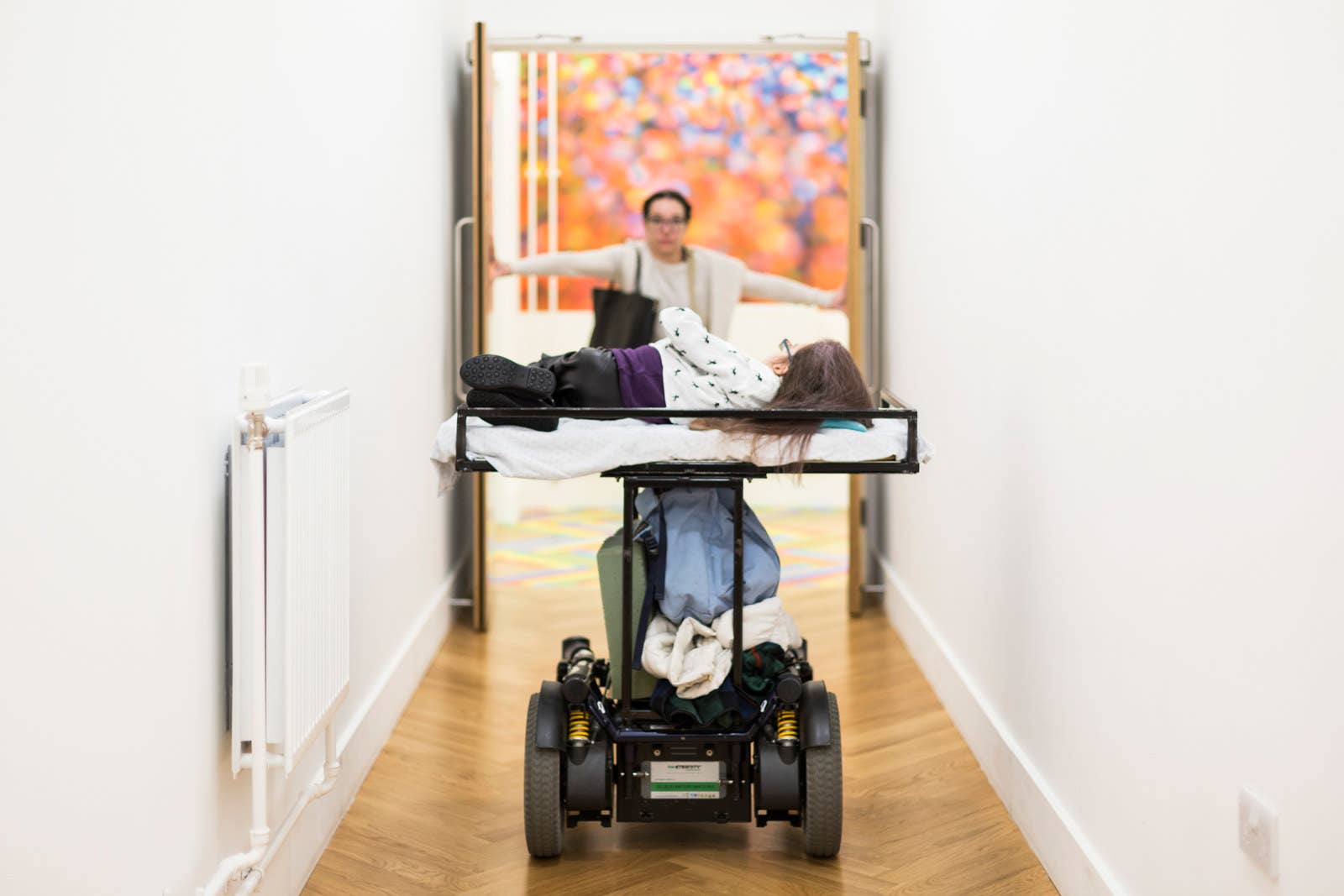
Elena Paolini, a 21-year-old student at the University of Westminster, almost missed a crucial exam because the lifts in the reception area of her university building were not working. She asked a member of staff to carry her wheelchair up the stairs while she was carried by her assistant, but says they refused. Instead, she had to rely on help from other students.
It wasn't the first time something like this had happened. Paolini, who has a motor disability and uses a powered wheelchair to get around, says she has missed lectures over the course of her degree because of faulty or broken lifts. She also couldn't access the common room to socialise with other students because the only accessible entrance is via the canteen, which is locked during certain times of the day.
To access one side of the building Paolini had to use the goods lift located by the café – but the external buttons haven't worked on numerous occasions for two years, she says. When she's used the lift, her assistant has had no other option but to reach the internal buttons using a broomstick. She says there is no way a wheelchair user could use it by themselves.
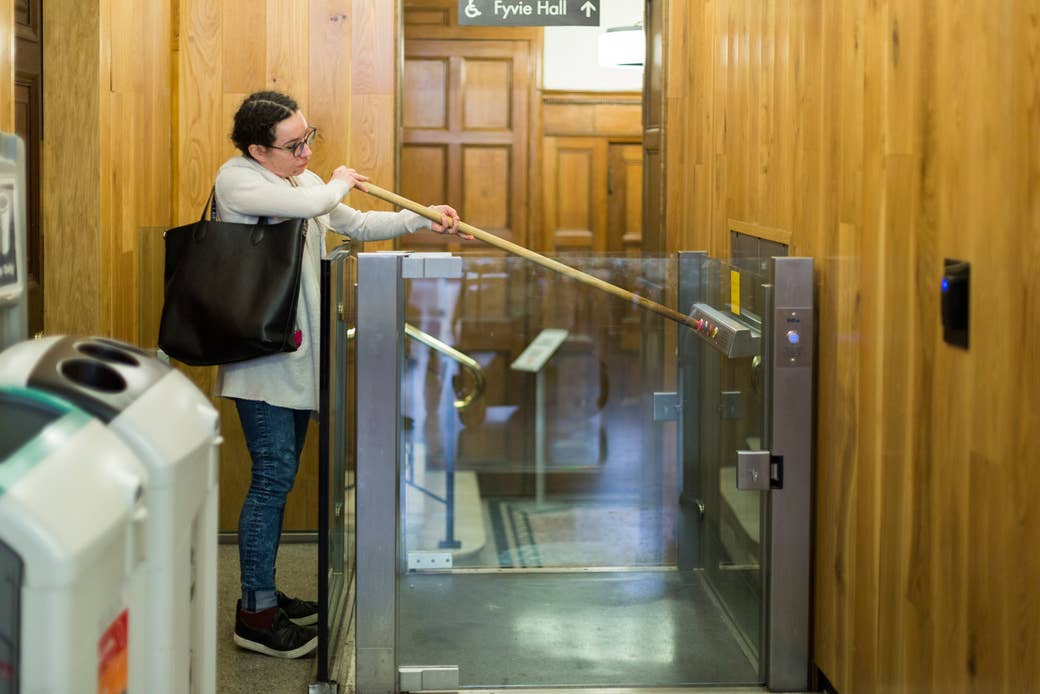
Paolini, who graduates this year in international relations, told BuzzFeed News that on numerous occasions she was left waiting outside the university's various campuses because staff assistance have failed to spot her and allow her access into the building.
"In all campuses, in order to go through the gates the receptionists have to open them for me every single time," she said. "Sometimes I wave at them and they don't see me. Without an assistant it would be very difficult to navigate the campuses."
These are just a few of many issues Paolini has filed complaints about – but the complaints often amount to nothing, she says. BuzzFeed News has seen several emails dating back to 2014 showing correspondence between her and various members of staff at the university detailing various problems she had been experiencing.
"I have written emails to staff, often without result," she said. "The disability office has not proven to be helpful. The fact is, I really don't have the time to investigate every single problem, as so many occurred and I would need to employ a secretary to keep up with everything."
Paolini described how during her first year at university she felt alienated and frustrated in the lecture theatre. "The only place where I could see the blackboard was right under the air conditioning," she said. "I have sent tons of emails explaining that catching cold is quite debilitating for me, [but] they said they couldn't turn it off. So I attended classes dressed up with scarf and coat – basically, I looked like a snowman."
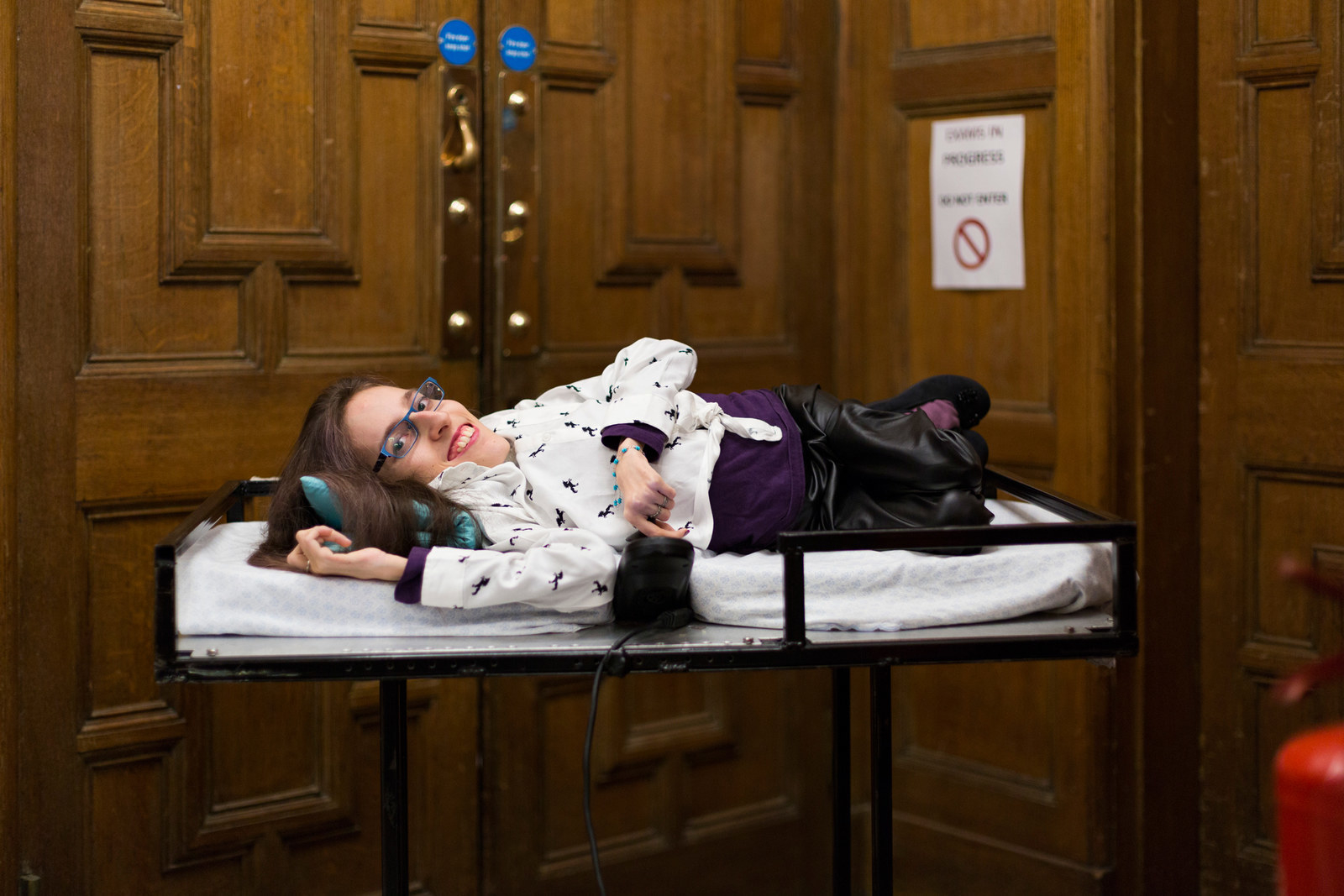
Rachel O'Brien, NUS disabled students officer, told BuzzFeed News that universities need to take a different approach to access and inclusion: for example, by making campuses step-free to encourage wheelchair users to apply and attend university. Despite a 56% rise in students with a known disability since 2010, disabled people are underrepresented in higher education.
"Universities are only putting certain access measures in place when an individual students needs them, often after said student has spent hours chasing up institutions," O'Brien said.
"It would be a far more efficient and stress-free situation for disabled students if universities took a more systemic approach to access and inclusion, whilst recognising there is still some need for individual support."
In 2012 students who declared their disability made up just 9.5% of the population at British universities. The latest statistics show that disabled people are around half as likely to hold a degree-level qualification compared to nondisabled people.
O'Brien says there is problem with how universities deal with their legal responsibilities towards disabled people, as outlined in the Equalities Act 2010, which says reasonable adjustments should be made.
"What is counted as 'reasonable' is not qualified or quantified in any way," she said. "In fact, it is up to the institution itself to decide what is reasonable, which presents a huge conflict of interest. Ideally, universities would be using an independent expert to make decisions around what a reasonable adjustment is, rather than making that assessment themselves."
A University of Westminster spokesperson told BuzzFeed News the institution is committed to supporting diversity and equal opportunities for all of staff and students. "We endeavour to create an environment where all our staff and students feel supported in their needs whatever their ability," they said.
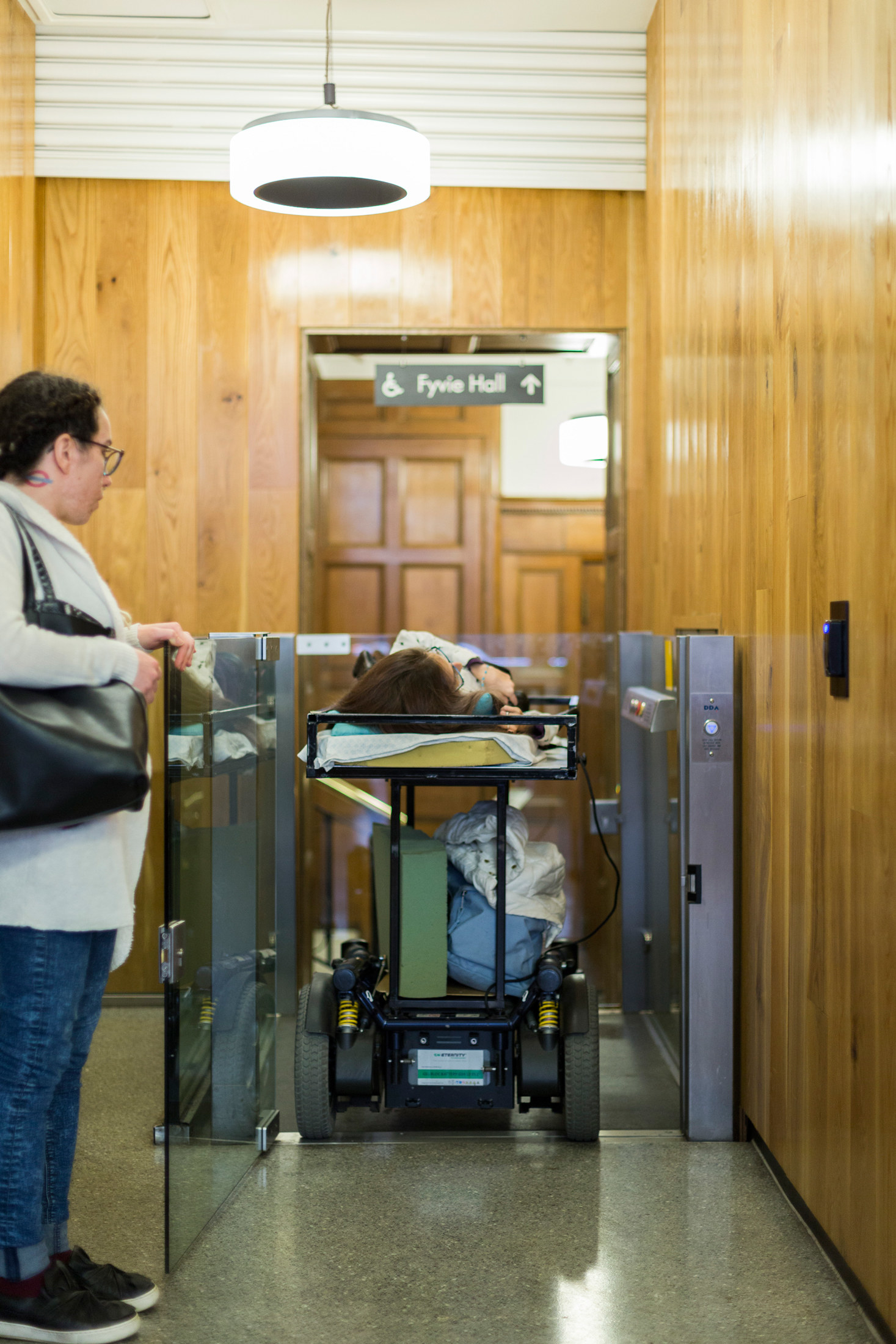
"To enable this, classes are arranged in the most accessible rooms in the campus where the students’ course is based. Elena Paolini studies at our Regent Street Campus which is a listed building and as such we are limited in the modifications that we can make to create the most accessible environment.
“Occasionally lifts break down and we endeavour to fix these as quickly as possible and we also stock spare parts on campus to minimise any delays. The picture of the lift [one of several sent to the university by BuzzFeed News] is misleading as it portrays an access lift as the 'goods lift'. The access lift can be worked by going into the lift."
They said the lifts were now in full working order.
The spokesperson continued: “We support our students who require additional assistance and strive to help them as much as we possible. Unfortunately access is not straightforward in the Regent Campus because it is a listed building.
"Our security teams are aware of Elena’s needs and she has side access to the building which would also provide entry to the common areas, however health and safety regulations prevent staff from being able to physically assist students.
“Accessibility of service is of great importance to the University of Westminster and we welcome a wider public debate on the limits placed on listed buildings in the context of disability access.”
O'Brien said that in her opinion it was untrue that listed buildings could not be adapted for accessibility. "Often, the excuse of listed buildings is used as a means to shut down calls to adapt buildings so they are accessible," she said. "However, it is not true that listed buildings can’t be changed. You need only look at the example of Durham Cathedral, a Grade I listed building which is now completely wheelchair-accessible, to see that it can be done."
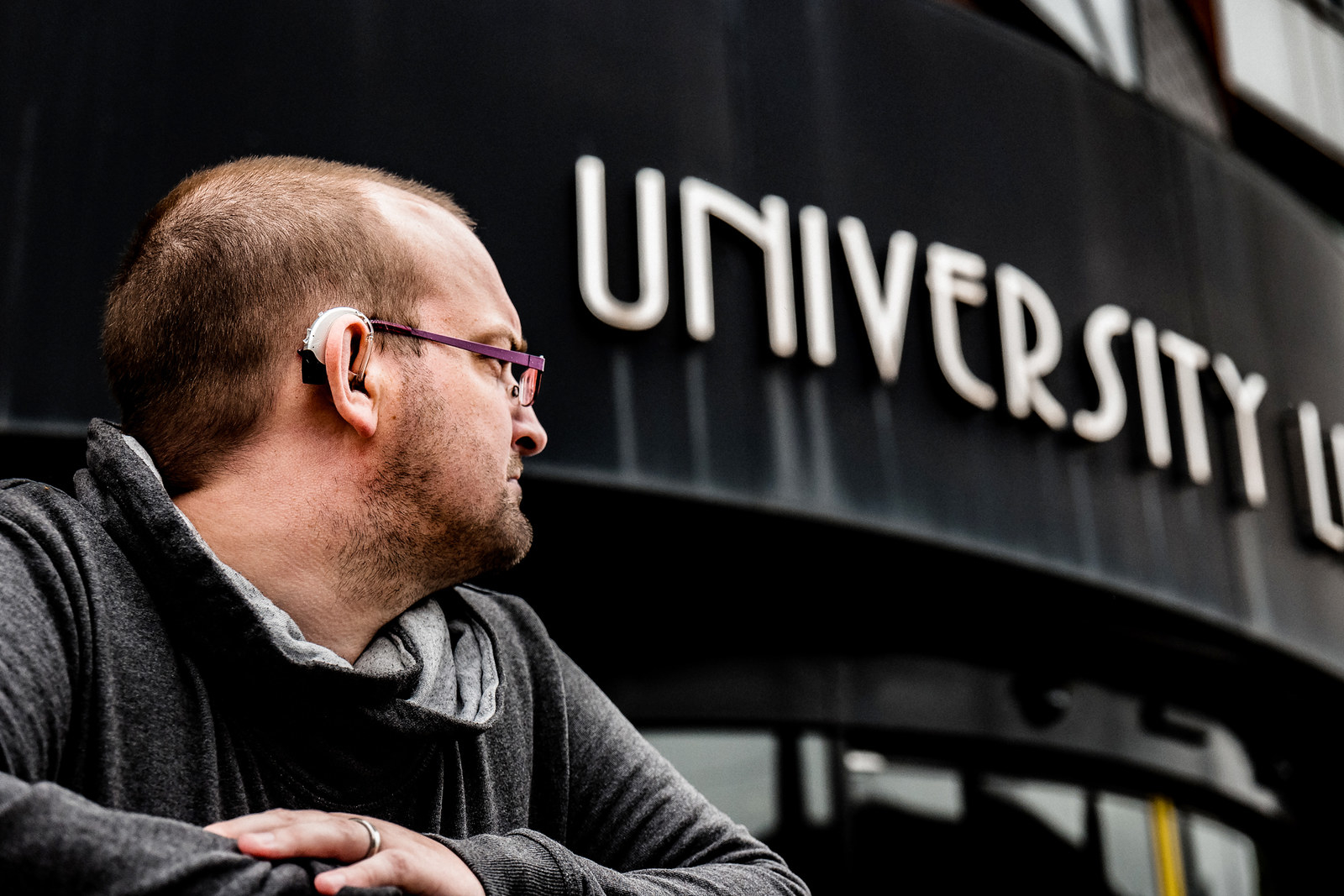
Problems with accessibility are not restricted just to mobility issues. Deaf student Dean Kamitsis told BuzzFeed News that accessibility issues at his university have left him feeling hopeless and depressed.
Kamitsis, 33, is a student at the University of Central Lancashire. He has just completed a foundation year and is due to start the first year of a three-year degree in film production in September.
There is no doubt he is talented. During his short time at university he has created a short video piece that was selected to be included in an international film festival in Los Angeles later this year. He also won the prize for the most outstanding student, and for the best overall performance.
But the journey hasn't been easy, and he says there have been various instances where he has felt discriminated against while studying. For example, getting subtitles for video content has been a major problem for him. Sometimes, he says, the subtitles are inaccurate, and other times no subtitles are available at all. He says it means he often has to sit through lectures for over an hour without any idea about what is going on.
"One of my lecturers had assumed that there were subtitles on the film – and hadn't actually checked," he told BuzzFeed News. "This film was 80 minutes long, and didn't have subtitles. I tried to watch it, but couldn't make head nor tail of the film. I watched about 30 minutes and left the room."
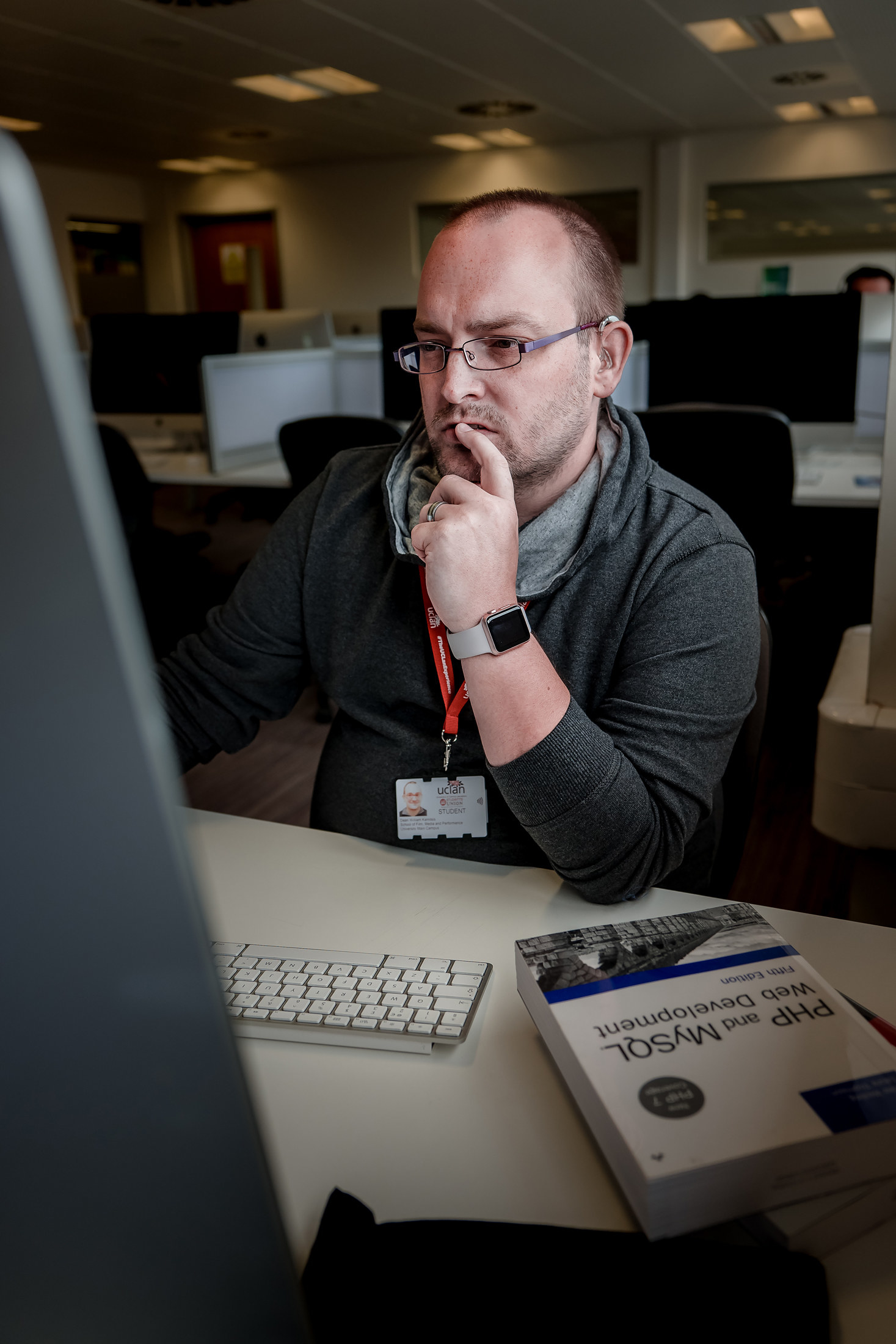
The impact these issues have had on his health, wellbeing, and social life has been devastating. "I felt pretty upset to be honest," Kamitsis said. "I say upset, I mean depressed, totally depressed. I was missing out on joining in with all my classmates because of my ears – I'd been let down through something I had no control over – my disability.
"I wanted to throw myself over the balcony – it had become too much. People don't seem to understand that our disability is something that controls us, and that it can be really, really depressing, having to keep fighting just to be able to join in. It's so tiring having to keep on banging the disability drum."
Some of the most frustrating incidents have taken place at his student union, he said. On one occasion Kamitsis says he couldn't attend a student union event because the organisers didn't arrange an interpreter for him despite his repeated requests for one.
"As soon as I knew about the event, I requested interpreter support at the event as I know the uni has a fantastic team of BSL [British Sign Language] interpreters," he said.
"It took days of them passing things backwards and forwards – and me chasing – and then there wasn't enough time to find available interpreters. So it meant I couldn't go."
It was only the beginning of his student-union-related issues. A few weeks later, there was a similar situation at a training event for volunteers. On this occasion the student union had arranged for an interpreter to be present, but Kamitsis claims the interpreter wasn't professionally trained and acted unprofessionally throughout the event.
"In walks this interpreter chap who straight away tells me that there are lots of deaf people out there that won't use him, because he's not a qualified interpreter," Kamitsis said. "He's actually a student that thinks he's good enough to be one. He wasn't."
Kamitsis claims the interpreter kept on disappearing while the training was ongoing. Eventually, he says he had enough and eventually felt he had no choice but to leave the event.
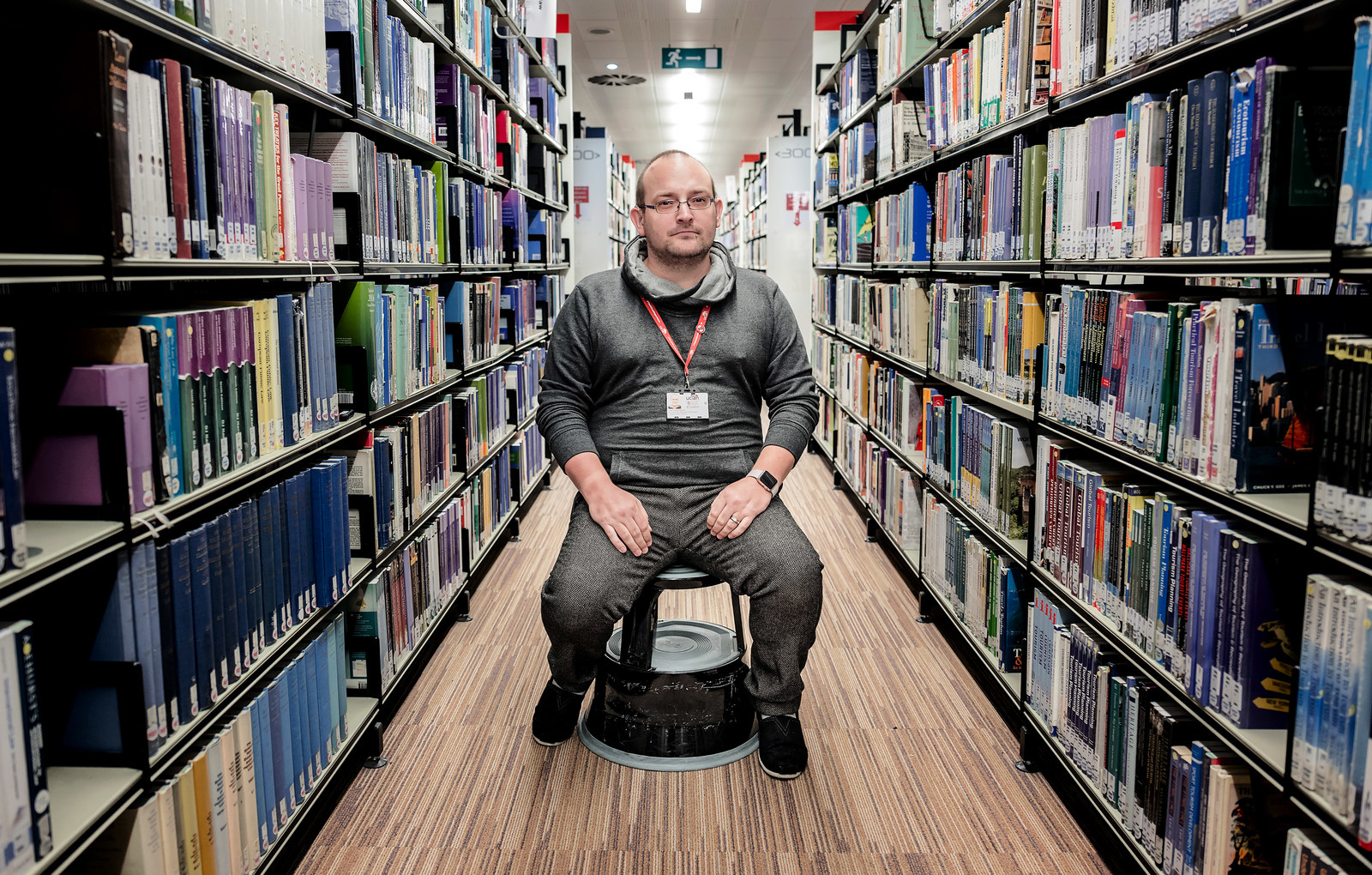
And it's not just events. Kamitsis says the student union has failed time and time again to make sure video content uploaded on to its website is made accessible by including subtitles.
"Each time I would have to request that they put subtitles on it," he said. "It got to the point, over time, that I'm pretty miffed that they keep on putting stuff up that isn't accessible. So I start getting vocal."
Despite Kamitsis speaking to the president of the student union and being assured that all content would be subtitled in future, this was not the case. "I have to remind them time and time again ... that they are discriminating against deaf and hard-of-hearing people.
"Eventually I had a meeting with the chief exec and it seemed pretty positive. I was asked what reasonable adjustment there was that they could do to fix it. My reply pretty much stands as 'if there's no subtitles available, don't upload it until there is'."
Kamitsis added: "I grew up hearing, so had the privilege of attending a mainstream school. I achieved all of my GCSEs and pretty much went straight into work, until I lost my hearing through a head trauma.
"Because I grew up hearing and identified that way, when I became deaf I knew exactly what I was missing out on. I know all the things that deaf people were not having access to, and what they were accepting because they didn't know otherwise."
Although he says his interpretation within timetabled lectures has been fantastic, outside of that his experience at university has made it even more apparent that to him that there is a long way to go in terms of fighting for disability rights. "Having to constantly fight for access to things really rams it home that we aren't equal," he said. "Despite being told that this university is one of the best for access provisions, I began to feel like I was expecting too much – being able to access things.
"I don't think my demands were too high – being able to take part by watching media without needing to keep banging on for subtitles, having access to interpreters outside of lectures, and so on."
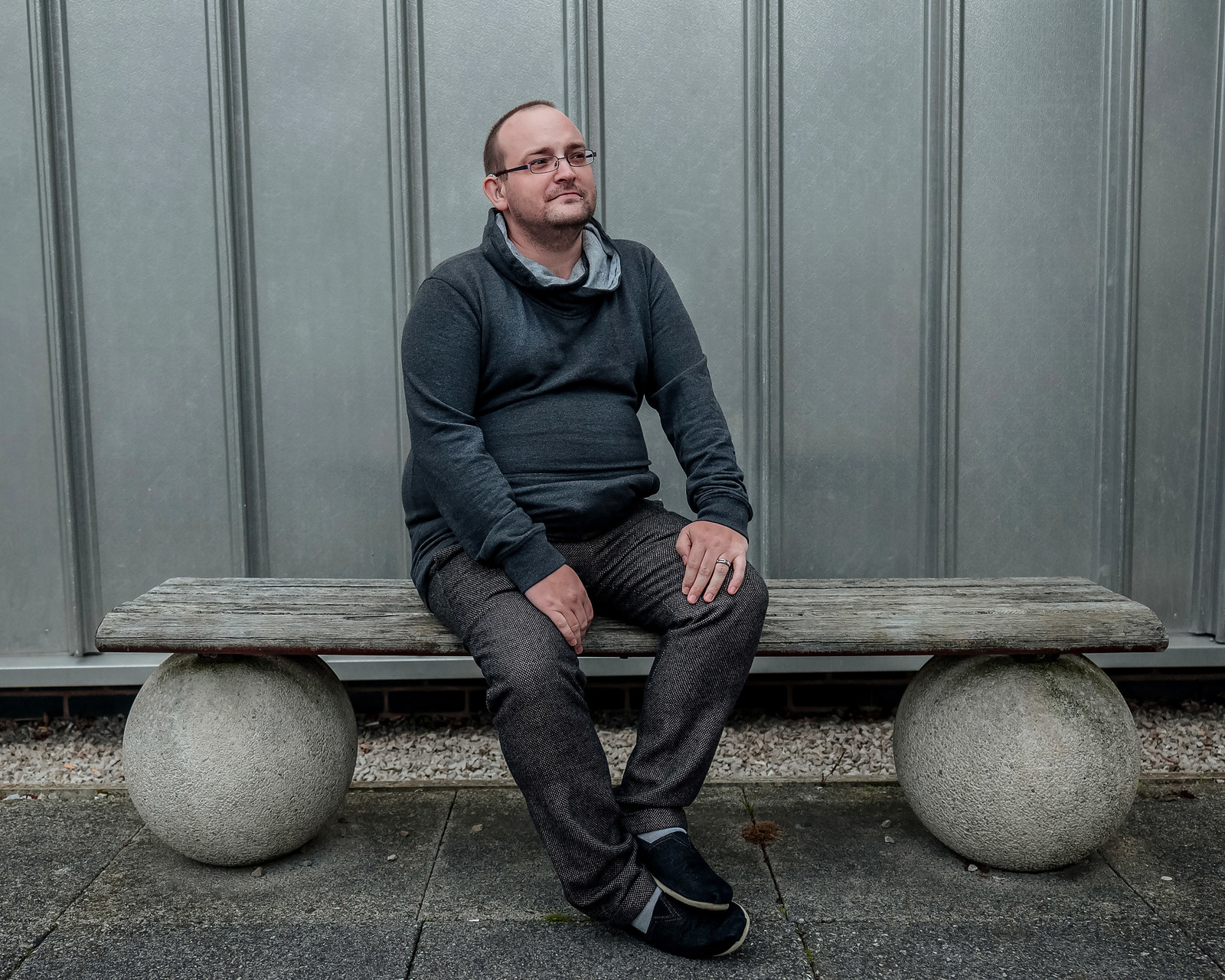
By demanding to be treated fairly Kamitsis says he has earned a reputation for "being a complainer", but he has inspired other disabled students to speak up about their experiences.
"My reputation at UCLan is now well-known," he said. "I'm very vocal. I'll fight for access for anyone that needs it. I now have students coming to me because they get asked, 'What would Dean do?'
"By empowering others, it means that people will fight for what they are entitled to, and hopefully make further [or] higher education establishments sit back and actually take note of what we say."
Kamitsis added: "The only way we can make positive change is by educating the educators in our needs. I'm not doing this for me. I'm doing it so that others don't have to go through what I have."
A spokesperson for the University of Central Lancashire and its student union told BuzzFeed News the institution is celebrated for welcoming all students, whatever their backgrounds or needs. They also said they are working with Kamitsis to address his concerns.
"We see Dean as a valuable student voice who is helping us to learn and improve," the spokesperson said. "All universities are striving to meet the learning needs of an increasingly diverse student body and we encourage frank feedback to help us achieve this."
The statement continued: “Both the University and SU [student union] are working with Dean to address his concerns, and while it is fair to say we didn’t get things right immediately, we have been working closely with him to identify ways to make the university experience equally accessible to deaf students.
“Dean has access to a team of interpreters and a note-taker in all his classes and all video content for his course has subtitles. We are working with the SU to ensure fully qualified interpreters cover all of its events and it has made significant adjustments to student media to ensure it is accessible. These adjustments will become standard practice.”
O'Brien, the NUS disabled students officer, said the experiences of people like Paolini and Kamitsis show how isolating it can be for disabled students when their needs are not met.
"We often cannot participate in the same activities and to the same extent in our classes as our nondisabled peers," she said. "It then becomes our individual responsibility to sort out the problems which arise from the lack of access, spending hours doing so when we could be studying or doing activities with other students."
Richard Lane, head of communications at disability charity Scope, told BuzzFeed News experiences like those of Kamitsis and Paolini are all too common.
"We often hear from disabled university students who have faced issues accessing different locations on campus or who have not received the reasonable adjustments they require for things like lectures and exams," Lane said.
“We need to see universities provide disabled students with the personalised and tailored support they need. We also need to ensure that, for those who need it, the social care system adequately supports them so that they can attend and enjoy the university experience."

